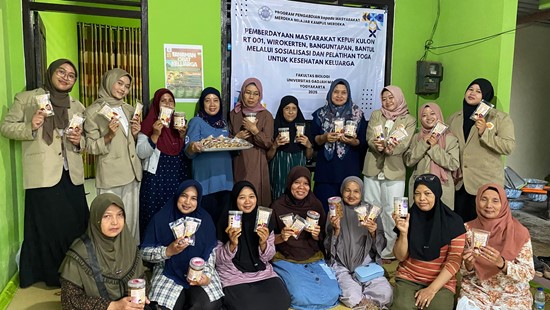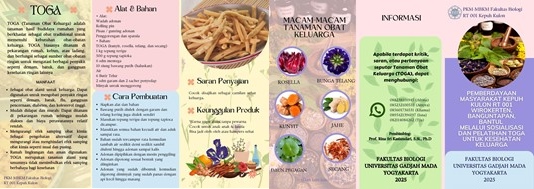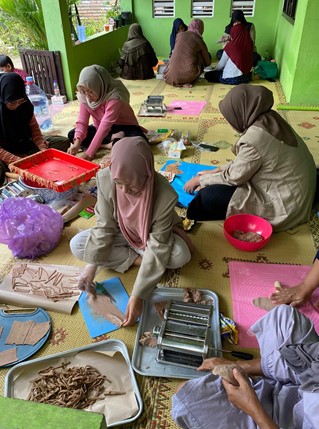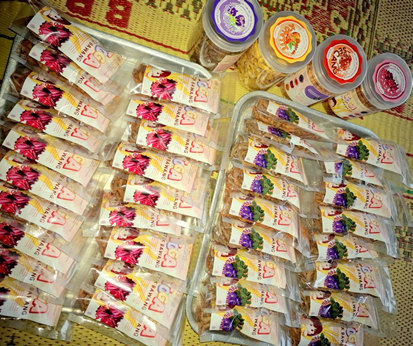Team Pengabdian kepada Masyarakat (PkM) – Merdeka Belajar Kampus Merdeka (MBKM) initiative of the Faculty of Biology, Universitas Gadjah Mada (UGM), led by Prof. Rina Sri Kasiamdari, S.Si., Ph.D., has successfully implemented the first phase of its activities in Kepuh Kulon RT 001, Wirokerten, Banguntapan, Bantul. This phase focused on the production of onion-based snack sticks enriched with four variants of Tanaman Obat Keluarga (TOGA – Family Medicinal Plants). The program engaged five undergraduate students Swastikhansa Parahita Sulistyaningrum, Afrina Syah Putri, Isna Kuminingrum, Asitya Fitri Miadi, and Amyra Asa Nurhanifa with the primary aim of raising community awareness about the health benefits of TOGA plants through interactive learning. Additionally, the initiative introduced an innovative approach to utilizing TOGA in developing value-added food products, particularly onion sticks infused with TOGA extracts, which are not only beneficial for health but also palatable to a broad demographic, especially children. This event marked the fifth consecutive year of PkM-MBKM implementation in RT 001 Kepuh Kulon. The current semester’s activities were conducted on Sunday, May 18, 2025, from 09:30 to 15:00 WIB at the residence of the RT head, Mr. Zamzuri. The event garnered enthusiastic participation from local residents, including 14 women and Mr. Sunartono, the village head (Kepala Dukuh) of Kepuh Kulon. In his opening remarks, Mr. Sunartono emphasized the practical uses of TOGA as part of daily health practices. He shared his personal experience consuming TOGA-based herbal drinks, noting significant health improvements, and encouraged the community to continue leveraging TOGA plants through the program. He also urged local residents to sustain the initiative independently, promoting a spirit of productivity and creativity within the community. Prof. Rina highlighted the importance of TOGA utilization in improving public health and fostering local innovation. She emphasized the potential of incorporating butterfly pea (Clitoria ternatea), roselle (Hibiscus sabdariffa), sappanwood (Caesalpinia sappan), and turmeric (Curcuma longa) into food products such as onion sticks, especially given children’s general aversion to medicine. She also underscored the crucial role of community solidarity in the program’s success and its potential contribution to the local economy by promoting TOGA-based healthy snacks as a new entrepreneurial opportunity.
The main activities included a knowledge dissemination session followed by a hands-on workshop on producing TOGA-enriched onion sticks. Participants were introduced to TOGA concepts, health benefits, the nutritional properties of selected TOGA plants, and the step-by-step methodology for snack preparation. The community members were divided into four groups, each focusing on one TOGA variant (butterfly pea, turmeric, roselle, and sappanwood). Each group prepared dough following a standard recipe until it reached the desired consistency. The dough was then flattened using a rolling machine, cut into uniform strips, deep-fried, and packaged in labeled plastic pouches and jars to improve product appeal. To further engage participants, a quiz session was held at the end of the activity, with door prizes awarded to active attendees.
The enthusiasm and skill displayed by the residents during the workshop are expected to drive the program’s sustainability. Additionally, the PkM-MBKM team provided a complete set of equipment and a pressing tool to enable continued production by the community. The next phase of the program is scheduled for the first semester of the 2025/2026 academic year (September), focusing on further processing of TOGA into additional value-added products to enhance community welfare. This community service program aims to expand knowledge and practical skills in processing TOGA into beneficial health products, thereby contributing to improved public health and local economic resilience. The initiative aligns with several Sustainable Development Goals (SDGs): SDG 2: Zero Hunger; SDG 3: Good Health and Well-being; SDG 8: Decent Work and Economic Growth and SDG 12: Responsible Consumption and Production.
Tagline:
SDG 2: Zero Hunger
SDG 3: Good Health and Well-being
SDG 8: Decent Work and Economic Growth
SDG 12: Responsible Consumption and Production





